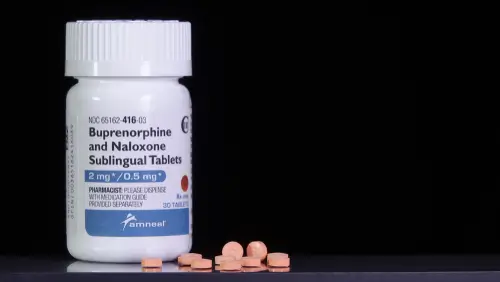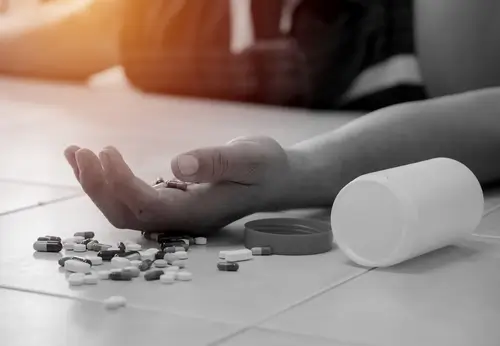Suboxone is a prescription medication used in medication-assisted treatment for opioid addiction. It contains buprenorphine and naloxone, which work together to alleviate withdrawal symptoms and reduce cravings for opioids. According to the 2021 National Survey on Drug Use and Health, 71, 901 people aged 12 years old and up were using some form of opioid in the past year. Since Suboxone is a popular medication for people withdrawing from opioid abuse, it’s more essential than ever to understand the dangers and treatment options for Suboxone.
In this article, we will cover what Suboxone is, the side effects of Suboxone, how it works, the correlation between Suboxone and opioid addiction, and the treatment options available for Suboxone abuse.
What is Suboxone?
Suboxone is a prescription medication used in the treatment of opioid addiction. It is a brand name for a combination of two active ingredients: buprenorphine and naloxone. Suboxone is considered a medication-assisted treatment (MAT) for opioid addiction. It is meant to be part of a comprehensive treatment plan that includes counseling, behavioral therapy, and support groups.
Suboxone is taken as a sublingual film or tablet, meaning it is placed under the tongue to dissolve. It can also be placed between the gums and the cheek to dissolve. Each form has differing effects on the body and how long it stays in your system. It is typically taken once a day.
While Suboxone can be an effective tool in addiction recovery, it has risks. Understanding the side effects of Suboxone in contrast to opioid withdrawal is imperative.
Side Effects of Suboxone
Like any medication, Suboxone can cause side effects. While many people tolerate Suboxone well, some may experience mild to severe side effects. Some of the common side effects are:
- Nausea or vomiting
- Dizziness
- Bloating or swelling of the face, hands, arms, legs, or feet
- Loss of appetite
- Insomnia
- Headache and chest pain
- Skin rash or hives
- Overactive reflexes
- Depression or anxiety
It is important to note that Suboxone can also cause allergic reactions in some people. Signs of an allergic reaction include rash, itching, swelling, severe dizziness, and trouble breathing.

How Suboxone Works
Suboxone works by binding to the same receptors in the brain as opioids, but with less intense effects. This is why it is used for treating individuals with substance use disorder, as it allows them to slowly taper off from using opioids. The two main ingredients of Suboxone are buprenorphine and naloxone, which interact with the body in similar but different ways.
Buprenorphine’s Role
Buprenorphine is one of two ingredients in Suboxone and was one the first ingredients to treat opioid addiction. Buprenorphine was created to act as a lesser opioid than heroin or morphine.
Buprenorphine is a partial opioid agonist, which means it binds to the same opioid receptors in the brain as opioids, but with less intensity. It activates the receptors enough to reduce withdrawal symptoms and cravings for opioids but not enough to produce the euphoric effects of opioids like heroin, morphine, or oxycodone. Buprenorphine has a ceiling effect, which means that taking more of it will not produce greater effects beyond a certain point, which helps reduce the risk of overdose.
Naloxone’s Role
Naloxone is the second ingredient in Suboxone and works similarly to buprenorphine. However, naloxone is included in the drug to prevent misuse of it.
Naloxone is an opioid antagonist which blocks the effects of opioids on the brain. If someone tries to abuse Suboxone by injecting it, the naloxone can cause them to rapidly enter into withdrawal, which can be uncomfortable and unpleasant. Because naloxone is only active when Suboxone is injected, it does not affect the effectiveness of the medication when it is taken as directed, but it can help to prevent overdose if someone accidentally takes too much Suboxone.
Suboxone and Opioid Addiction
Suboxone is an essential drug in treating opioid addiction because it allows people to detox from opioids. Opioid addiction is a chronic and relapsing drug addiction that can devastate individuals and their families. It can lead to various health, social, and economic problems, including overdose, infection, and legal issues.
Suboxone reduces withdrawal symptoms and opioid cravings, making it easier for individuals to focus on recovery. By reducing these symptoms, Suboxone can improve the quality of life for individuals in recovery. Another benefit of Suboxone use in treating opioid addiction is that it can be used as a long-term maintenance treatment option for individuals with opioid addiction.
It has become common to see individuals prescribed Suboxone to treat their opioid use disorder. While this may seem like a good thing to be helping those in active recovery, long-term use of Suboxone can also turn into Suboxone addiction.

Suboxone Addiction and Abuse
Suboxone is a treatment option for opioid addiction, but like any medication, it can be abused and lead to addiction. The abuse of Suboxone and addiction can occur when individuals misuse the medication in ways that are not prescribed, such as taking higher doses, using it for longer periods, or combining it with other substances.
The biggest concern for Suboxone abuse is the risk of overdose. By prescribing an individual Suboxone, it can set that person up for addiction and drug abuse. Many people may not notice that they have become addicted to Suboxone, so it’s essential to recognize the sign of Suboxone abuse and withdrawal.
Signs of Suboxone Abuse
Suboxone abuse can lead to physical and psychological dependence and can cause a range of negative effects on an individual’s health, relationships, and overall quality of life. Some common signs of Suboxone abuse and addiction include:
- Using Suboxone outside of a prescribed treatment plan
- Taking higher doses of Suboxone than prescribed
- Using Suboxone for longer periods than prescribed
- Combining Suboxone with other substances, such as alcohol or benzodiazepines
- Continuing to use Suboxone despite negative consequences, such as health problems or relationship issues
- Craving Suboxone
- Experiencing withdrawal symptoms when not using Suboxone
Suboxone Withdrawal Symptoms
Suboxone withdrawal symptoms can vary from person to person depending on how much they use the drug, how long they have been using it, and how frequently they use it. However, there are some common withdrawal symptoms from Suboxone abuse to be aware of. It’s important to note that these withdrawal symptoms are similar to opioid withdrawal symptoms, as Suboxone acts similarly to opioids in your system. Here are some common Suboxone withdrawal symptoms:
- Nausea and vomiting
- Diarrhea or constipation
- Abdominal cramps
- Muscle aches and pains
- Anxiety and restlessness
- Insomnia
- Sweating and chills
- Headaches
- Irritability and mood swings
- Depression

How Long Does Suboxone Stay in Your System?
Suboxone has a relatively long half-life, meaning it stays in the body for a significant time. The length of time that Suboxone stays in the system can vary depending on factors such as the individual’s metabolism, age, weight, overall health, and the dose and frequency of Suboxone use. Because of the two ingredients in Suboxone, we need to look at how long those individually stay in your system to understand just how long Suboxone can last in the body.
Buprenorphine has a half-life of approximately 24-42 hours, while naloxone has a shorter half-life of approximately 1-2 hours. This means that while the naloxone component of Suboxone is eliminated from the body relatively quickly, buprenorphine can remain in the system for several days.
Drug Testing for Suboxone
Drug testing for Suboxone can be performed using various methods, including urine, blood, and hair follicle tests. The amount of time Suboxone can be detected in these tests varies based on the person’s body composition, frequency of use, and amount of use.
Urine tests can detect Suboxone up to 3-4 days after the last dose. However, it is essential to note that urine tests can also produce false positives or false negatives.
Blood tests are typically more accurate than urine tests and can detect Suboxone for up to 24-48 hours after the last dose. However, blood tests are also more invasive and expensive than urine tests.
Hair follicle tests can detect Suboxone for a much longer period of time than urine or blood tests. They can detect Suboxone use for up to 90 days after the last dose.
Treatment Options for Suboxone Addiction
Suboxone treatment is the same type of treatment you would expect from someone suffering from opioid addiction. Fortunately, several effective treatment options are available at treatment centers to help individuals overcome Suboxone addiction and achieve lasting recovery. Some of the most common treatment therapies available are:
- Medication-Assisted Treatment (MAT): MAT involves using medications such as methadone or buprenorphine to help manage withdrawal symptoms and cravings associated with Suboxone addiction.
- Behavioral Therapy: Behavioral therapy, such as cognitive-behavioral therapy (CBT), can help individuals identify and adjust negative patterns of thinking and behavior associated with addiction. Therapy can also help individuals develop coping skills to prevent relapse.
- Inpatient Rehab: Inpatient rehab involves a residential treatment program where individuals live at a treatment facility for some time, typically 30-90 days. This type of treatment provides a structured environment with round-the-clock support, including medical and mental health care, therapy sessions, and peer support.
- Outpatient Rehab: Outpatient rehab involves regular visits to a treatment center for therapy and other types of support. This treatment allows individuals to continue working, attending school, or fulfilling other responsibilities while receiving the support they need to overcome addiction.
- Support Groups: Support groups, such as Narcotics Anonymous (NA), provide a supportive environment for individuals to share their experiences, receive encouragement and accountability, and learn from others who have overcome addiction.

Suboxone Addiction Treatment at Launch Centers
Opioid addiction and Suboxone addiction are two very similar, complex diseases affecting millions of people worldwide. Struggling with this alone is difficult; luckily, you do not have to do it alone.
Launch Centers is dedicated to providing comprehensive, trauma-informed approaches to addiction to ensure our clients receive the best care possible. We offer mental health services, addiction treatment services, and dual diagnosis while building a sober community you can rely on.
If you or a loved one are struggling with addiction, contact us today to learn more about our treatment programs and how we can help you begin your recovery journey.






